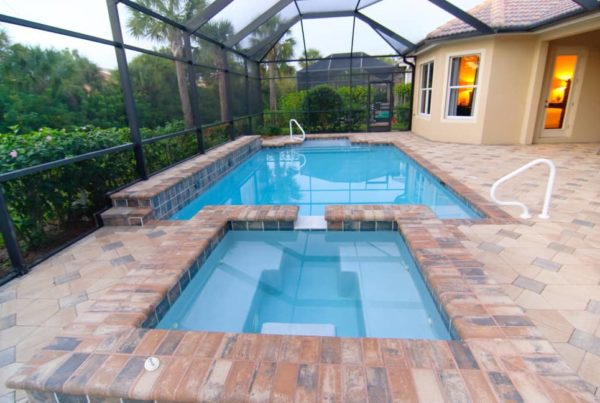
Imagine coming home after a long day inside and all you would like to do is jump into your pool. As you approach the pool to start your swim, you notice some green algae has begun to grow on the surface of your swimming pool. After testing the water chemistry, you realize that a boost of chlorine is needed. So, you shock the pool in hopes of eliminating the algae quickly. How long after shocking a pool can you swim? The rule of thumb is 24 hours, however, in some cases you can swim sooner.
Let’s take a look below at what the health and safety recommendations are.

What Is Shock
Shocking the pool is a way to ensure that your free chlorine levels are boosted. In addition, boosting your free chlorine ensures that your algae and bacteria are destroyed. Keep in mind that shocking the pool is considered a process of adding chemicals to the pool to make the water chemistry ideal for chlorine to work efficiently. Additionally, the types of chemicals in your shock ranges from calcium hypochlorite, lithium hypochlorite, potassium peroxymonosulfate, and dichlor.
How Long Before I Can Swim
Keeping up with the maintenance of your pool is important. The general rule of thumb for shocking a pool and then swimming is 24 hours. Always test your swimming pool water pH and chlorine output. According to the Center for Disease Control, a good range for pH is between 7.2 and 7.8 and chlorine between 1.0 and 4.0 ppm.

How Much Does It Cost
The cost of shocking a pool can vary depending on how bad the condition of the pool is and the size of the pool in gallons of water. Generally speaking, you are likely going to spend between $25 and $50 per shock session. Hopefully, you won’t need more than a few bags to solve your algae growth issues.
Other Recommended Maintenance
Now that you have learned how long you have to wait before you can swim in a pool that has been shocked. Let’s say you cannot get to the store to buy the shock. Can you swim in a green pool? There are variations of answers to that question, so make sure you study up before jumping into a green pool.
If you have spent a lot of money shocking your pool or getting rid of the green from your pool, you might want to consider getting a pool inspection. A pool inspection could find underlying issues for why your pool water cannot stay chemically balanced. In some cases, it could be as simple as changing your pool filter. Look into getting a pool inspection.
Lastly, while you are on the topic of your pool and concerns that you might have with it, consider checking all of the safety features to make sure that they are in working condition. The main drain in your pool will have an anti-entrapment cover. Once your pool is cleared up, you might want to check the anti-entrapment drain cover. Over time, this piece of plastic could become damaged and break. You will want to replace it if this is the case.

When Do I Call A Professional
When you are dealing with a swimming pool, you want to make sure that all chemicals are checked and balanced. Diving into a pool that has recently been shocked with granular chlorine could end up causing you some health issues. Always read up on proper pool maintenance. Also, if you aren’t sure about how to care for the pool, consider hiring a professional pool technician.
In addition, you can reach out to your local home inspection team. They can conduct a full pool inspection of your pool and pool equipment or even your spa. After your home inspection team has finished, they can provide you with a recommendation for a reputable local swimming pool maintenance and service technician.
Conclusion
If you are needing to add shock to your pool, chances are something isn’t working correctly. Also, there is a strong chance that your chemicals are no longer in balance. Trying to fix your pools issues might end up costing you a lot of money. In this case, it is best to leave it up to the professionals.
Now that you know how long it takes before you can swim in a pool that has been shocked, you can rely on the professionals to handle it. Call Waypoint Property Inspection to inspect your home in Tampa, St. Petersburg, Lakeland, Orlando, Palm Beach, Ft. Lauderdale, and surrounding areas.



